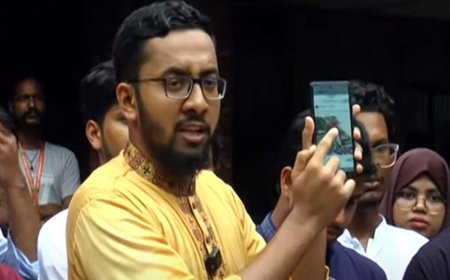Sweeping Cyber Law Reforms: Controversial Sections Scrapped, Digital Rights Recognized

The interim government of Bangladesh is set to enforce a revised Cyber Security Act within a week, eliminating nine controversial sections from the previous Digital Security Act. Law Adviser to the interim administration, Professor Asif Nazrul, made the announcement at a press conference held at the Foreign Service Academy on Tuesday, following a meeting of the Advisory Council. Press Secretary Shafiqul Alam and Youth, Sports and Local Government Adviser Asif Mahmud Sajib Bhuiyan were also present.
Earlier in the day, the draft ordinance of the revised cyber law was presented at a meeting of the Advisory Council chaired by Professor Dr. Muhammad Yunus. Adviser Nazrul stated that the ordinance could be published in the official gazette within the week, following some final adjustments.
Professor Nazrul emphasized, “For the first time, the internet has been recognized as a fundamental right in the new ordinance. Online gambling has been outlawed, and cyber-based abuse and sexual harassment of women and children have been explicitly criminalized.” He further noted, “Nine infamous sections from the previous act—under which 95% of cases were filed—have been repealed. All cases under these sections will now be automatically dismissed.”
He added, “From day one, we committed to abolishing the old Security Act and replacing it with a modern, rights-based legal framework. Our special assistant on information technology, Faiz, and many others have worked tirelessly. We revised the draft 25 times, taking extensive feedback, including three hours of deliberation with some of the law’s harshest critics.”
Following a final suggestion raised during the council meeting, the law will be finalized and implemented within the week.
Reiterating the law’s novel features, the Law Adviser stated, “The internet has now been acknowledged as a citizen’s right. Online gambling has been banned. For the first time, cyber harassment and sexual abuse targeting women and children are recognized as punishable offenses. The repealed nine sections were notorious and led to rampant abuse under the previous regime. With this reform, all related cases will be automatically nullified.”
Addressing concerns about freedom of expression, he clarified, “In terms of speech-related offenses, only two remain: dissemination of sexually abusive content involving women and children, and incitement of religious hatred. Religious hatred has been strictly defined to prevent misuse or false accusations. Any content that may incite religious violence has been criminalized.”
He added that cybercrimes involving artificial intelligence would also be punishable—making Bangladesh the first in South Asia to include such provisions. Cases related to speech offenses and cyber abuse must be reviewed by the court within 24 hours. If the judge finds the case to be baseless, it can be dismissed during the pre-trial stage, eliminating the need to wait for charge sheets.
“Many of the repealed provisions covered issues such as defamation involving the Liberation War, the Father of the Nation Bangabandhu Sheikh Mujibur Rahman, the national flag or anthem, and threats to law and order. These sections led to widespread harassment, particularly of journalists. They have now been abolished,” he said.
The new law also modifies previously criminalized acts, such as publishing false or intimidating content, and organizes cybercrimes under clearly defined terms to prevent past misuse. Even offenses such as cyber fraud, hate speech, sexual harassment, and blackmail are now bailable.
Another significant inclusion is the establishment of a Cyber Security Council authorized to remove offensive or unlawful content. The decision-making authority will now include members from civil society. Once content is taken down, court approval must be obtained within 24 hours. If the court objects, the content must be reinstated. Otherwise, a ruling within 72 hours will determine whether the removal stands.
“Any content removed must be disclosed to the public, so people can be aware and judge whether the government is acting lawfully or with ulterior motives,” said Nazrul.









































































































































































































